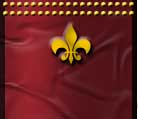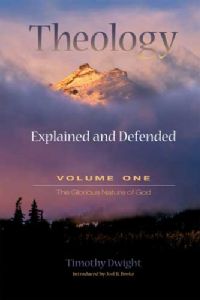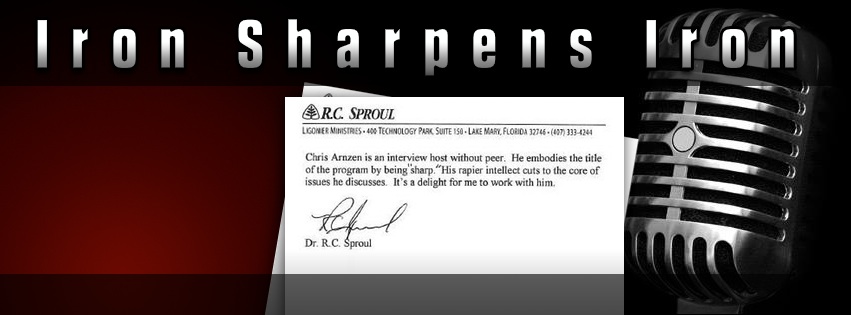




 |
|||||
 |
THEOLOGY: Explained and Defended (4 Volume Hardcover Set)
Timothy Dwight![]()
Timothy Dwight (1752-1817) was the grandson of Jonathan Edwards. He was both brilliant and godly. This is the Complete Four Volume Hardcover Set of his Magnum Opus: THEOLOGY: EXPLAINED & DEFENDED in a Series of Sermons. These sermons were preached every four years at the chapel at Yale Divinity School and were the means of incredible blessing to those who heard them. ![]()
"Dwight's theological sermons are worthy of careful study. Their clear, scriptural guidelines and experiential warmth promote practical Christianity. Read with discernment, they will still feed the soul today and challenge us to godly living in Christ Jesus." - Joel R. Beeke, Puritan Reformed Theological Seminary, Grand Rapids, Michigan![]()
William Sprague, in the book, 'Letters to a Daughter', page 82 wrote, "There is no work within my knowledge, so well adapted to answer this purpose, as the admirable system of Theology by the late President Dwight. It may look a little formidable to you at first, but I am almost sure that if you once engage in reading it, you will not be impatient to find its close. While the subjects are arranged with philosophical accuracy, they are discussed with a degree of perspicuity, force, and eloquence, for which I think you will look in vain, in any similar work."![]()
Volume One contains 38 sermons on the Existence, Attributes, Decrees and Works of God. Each sermon stands complete in itself, but they together exalt the glory of God in a way intended to humble and bless.![]()
Volume Two contains sermons 39-86 with the main focus on Christ our Mediator, and the Doctrines of Justification and Regeneration.![]()
Volume Three contains sermons 87-131 and begins with four sermons on Regeneration and concludes with 41 sermons on the Perfect Law of God.![]()
Volume Four contains sermons 132-173 and begins with the final sermon on the 10th Commandment and proceeds to examine both the ordinary and extraordinary Means of Grace before concluding the entire series with 11 sermons on the Last Things, including death, judgment, heaven and hell.![]()
SGSET![]()
SGHC sss CLST![]()
NEARLY 50% - VOLUME ONE: Existence, Attributes & Works of God![]() SGCB Price: $35.00 (list price $65.00)
SGCB Price: $35.00 (list price $65.00)![]()
NEARLY 50% - VOLUME TWO: Person & Work of Jesus Christ the Mediator![]() SGCB Price: $35.00 (list price $65.00)
SGCB Price: $35.00 (list price $65.00)![]()
NEARLY 50% - VOLUME THREE: The Perfect Law of God![]() SGCB Price: $35.00 (list price $65.00)
SGCB Price: $35.00 (list price $65.00)![]()
NEARLY 50% - VOLUME FOUR: The Means of Grace and The Last Things![]() SGCB Price: $35.00 (list price $65.00)
SGCB Price: $35.00 (list price $65.00)![]()
OVER 50% Off - COMPLETE FOUR VOLUME HARDCOVER SET![]() SGCB Price: $125.00 (list price $260.00)
SGCB Price: $125.00 (list price $260.00)![]()
Additional Information
• Outline of Four Volume Set
• Table of Contents
• Biographical Sketch
| Biographical Sketch |
TIMOTHY DWIGHT, DD, LL.D., grandson of Jonathan Edwards the elder, was born at Northampton, Massachusetts, May 14, 1752, and was graduated at Yale College at a very early age in 1769. Two years after his graduation he was elected a tutor in his college, and held the office during six years. Near the end of his tutorship he was licensed to preach, and soon joined the army of the Revolution as a chaplain to General Parsons's brigade. After a year spent in this service, he was called home by the news of his father's death in 1778, to take care of his mother and the family, being the eldest child of thirteen. Relinquishing his part of the family property, he taught school and preached for his own family's support. So highly was he thought of by his fellow citizens that they called him into public life, solicited him to give himself permanently to politics, and promised to secure for him a place in the Continental Congress. But he preferred to preach the Gospel, and, after several flattering calls which he declined, accepted one from the parish of Greenfield, in Connecticut, to become their pastor. Here he spent twelve years, from November 1783, onward. As his salary was inadequate to the expenses which his family and his hospitality obliged him to incur, he established an academy, the oversight of which he took upon himself, which was distinguished for the advanced and thorough training of its scholars, and in which upwards of a thousand young persons of both sexes came under his instruction. His reputation as an instructor and as a preacher led the corporation of Yale College in 1795 to elect him to the presidency of that institution, which had lately become vacant by the death of President Stiles.
It was during his residence at Greenfield that his two poems, one on the "Conquest of Canaan" by Joshua, an epic in rhyme, the other entitled "Greenfield Hill," and describing the scenery and the events of the neighboring country, were given to the world. These poetical works, which are not without glow and fire, are now forgotten; but some of the versions of the Psalms which he inserted in a revision of Dr. Watts's Psalms, with hymns annexed, published by direction of the General Association of the state in 1800, have stood their ground, and probably will never go out of use; we refer especially to those whose first lines are, "I love thy kingdom, Lord" (Psalm 137), and "Shall man, O God of life and light" (Psalm 88).
The state of Yale College at his accession to the presidency was far from being satisfactory, but his vigor, ability, and wisdom ere long infused into it a new life. With great wisdom, he selected young men for the several professional chairs. He himself preached, and with very great acceptance, in the college chapel; he instructed in morals, mental philosophy, natural theology, and the evidences of revelation; and the religious interests of the students found in him a director and a guide. Soon after he came to Yale College he found that many students were tainted with infidelity. He was among the first, and one of the very ablest defenders of the Christian faith in this country, and by his preaching, as by his sermons on "The nature and danger of infidel philosophy" published at the time, he may be fairly said to have driven infidelity from the college. On the whole, his administration of the college was a very successful one. To him more than to any other man Yale College is, indebted for its highly respectable position among the seats of learning in this country.
President Dwight died January 11, 1817, when not quite sixty-five, of a cancer in the neck of the bladder. He had a commanding person, a noble voice, great pathos, an ardent temper, an excellent judgment, and sincere piety. His conversational powers were of the highest order. His style in his extempore addresses and in his written discourses was fervid and eloquent, but somewhat too rhetorical. He entered with great interest into the politics of the day, as an adherent of the principles of Washington and of the Federal party. His theology was Calvinism as modified by the two Edwardses, his grandfather and uncle. In his youth he preached it with warmth, but as he advanced in years he laid little stress on any doctrines except those in which all evangelical Christians were agreed. His life was full of acts of hospitality and benevolence, and his sympathies were of the tenderest sort. During a great part of his life his eyes were too weak to be used, and his works were principally written by an amanuensis. His principal works published under his name, besides those which have been already mentioned, were Theology explained and defended (Middletown, Connecticut, 1818, 5 volumes; and in a multitude of editions afterwards in 4 volumes, both in the United States and in England): - Travels in New England and New York (New Haven, 1821, 4 volumes, which contained the record of journeys on horseback undertaken for his health during vacations), and Sermons of an occasional character (New Haven, 1828). See Life prefixed to his Theology, and Dr. Sprague's life of him in Sparks's American Biography, volume 14, or new series, volume 4.
